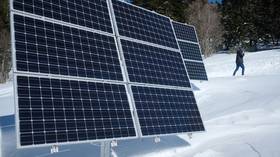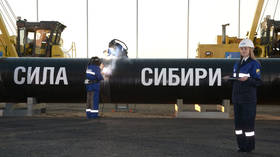End of Moscow’s reliance on gas & oil? Russia's solar power potential means it could become world's green-energy leader – expert

Russia, a country known for its vast reserves of oil and gas, has the potential to become a world leader in 'green' hydrogen and solar power. That's according to Dr Ajay Mathur, head of the International Solar Alliance (ISA).
Founded in 2016, and first proposed by Indian Prime Minister Narendra Modi, the organization initially focused on grouping together countries that lie in between the tropics, with the possibility of other states gaining associate membership. It aims to boost the consumption of solar energy as a means of reducing dependence on fossil fuels. Now, Mathur is looking at expanding the group to other countries with a significant solar future – including Russia.
"We believe that especially the southern part of Russia has a huge potential for the production of solar energy," Mathur told Moscow news agency RIA Novosti. "Both Russia and ISA can learn from each other. ISA provides a set of lessons from other countries, and the lessons we take from Russia can be shared with the solar alliance and the entire global solar-user community."
Also on rt.com Putin announces new emission quotas & corporate responsibility for environmental damage as Russia begins to get tough on pollutersAccording to Mathur, Russia has made great strides in the development of hydroelectric power plants, and leads the world in water electrolysis.
"Russia is the largest country on Earth. We are counting on it to become a member of the solar alliance," he continued. "I would really like to come to Russia and pay tribute to the Russian leadership."
Aside from solar, Mathur believes Russia can take a leading role in producing 'green' hydrogen. Green hydrogen is created by using solar energy to split water. It is distinct from 'grey' hydrogen, which is made through fossil fuels, and from 'blue' hydrogen, which uses non-renewable energy sources but has a low carbon footprint.
Earlier this month, it was revealed that Russia could earn up to $100.2 billion a year by 2050 from the export of environmentally friendly types of hydrogen. In addition, the head of the Ministry of Industry and Trade, Denis Manturov, revealed that the country would develop technology for the production of both 'green' and 'blue' hydrogen.
While Russia's economy still strongly relies on exports of fossil fuels, the country's government has begun to take climate change and global warming more seriously. Last week, President Vladimir Putin announced that he would push through legislation to establish strict controls of harmful emissions, with the goal of rapidly reducing the volume of net greenhouse gases.
"We must respond to the challenges of climate change, adapt agriculture, industry, utilities, the entire infrastructure," Putin said. "[We must] create an industry to recycle carbon emissions, achieve a reduction in their volume and introduce strict control and monitoring."
Like this story? Share it with a friend!













